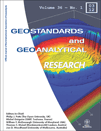
GEOSTANDARDS AND GEOANALYTICAL RESEARCH
Scope & Guideline
Elevating Geological Insights with Rigorous Analysis
Introduction
Aims and Scopes
- Reference Material Development:
The journal emphasizes the creation and certification of geological reference materials that serve as benchmarks for various analytical techniques, ensuring consistency and accuracy in measurements across laboratories. - Isotope Analysis Techniques:
A significant focus is on methodologies for isotopic analysis, including advancements in mass spectrometry and laser ablation techniques, which are critical for understanding geological processes and material composition. - Geochemical Mapping and Characterization:
The journal covers studies involving the spatial characterization and compositional analysis of geological materials, enhancing the understanding of mineralogy and geochemistry through advanced analytical techniques. - Methodological Innovations in Geochemistry:
Addressing the need for improved analytical methods, the journal publishes research that advances existing techniques or introduces novel approaches for geochemical analysis, particularly in areas like trace element determination and isotopic measurements. - Statistical and Data Analysis in Geoanalysis:
The journal also focuses on the application of statistical methods to improve the reliability of geochemical data interpretation, including error analysis and data correction procedures.
Trending and Emerging
- In Situ Analytical Techniques:
There is a notable increase in research focusing on in situ methods, particularly those utilizing laser ablation and ion microprobe techniques, which allow for high spatial resolution and minimal sample preparation, enhancing the accuracy of isotopic and elemental analyses. - Multi-Isotope Systems:
The trend is shifting towards the analysis of multiple isotopes simultaneously, which provides more comprehensive insights into geological processes and material origins, reflecting a growing interest in complex geochemical systems. - Automation and High-Throughput Techniques:
Emerging studies are increasingly incorporating automated systems for sample analysis, improving throughput and consistency, which is crucial for large-scale geochemical studies and environmental monitoring. - Standardization and Quality Assurance:
There is a rising emphasis on the standardization of analytical procedures and quality assurance measures to ensure data reliability and comparability across different laboratories and studies. - Sustainability in Geochemical Analysis:
Recent publications suggest a growing awareness of sustainability issues within geochemical research, focusing on the development of environmentally friendly methods and materials that minimize waste and resource use.
Declining or Waning
- Traditional Geochronology:
While still relevant, traditional geochronological methods such as U-Pb dating have seen a decrease in focus compared to novel in situ methods and multi-isotope approaches, reflecting a shift towards more advanced and versatile analytical techniques. - Basic Elemental Analysis Techniques:
There has been a reduced emphasis on conventional elemental analysis methods, such as bulk chemical assays, as researchers increasingly adopt sophisticated techniques like laser ablation and inductively coupled plasma mass spectrometry (ICP-MS) for higher resolution and accuracy. - General Reviews and Bibliographic Studies:
The frequency of general reviews and bibliographic studies has diminished, suggesting a preference for more specialized and cutting-edge research articles that provide direct advancements in methodologies and applications rather than retrospective analyses.
Similar Journals
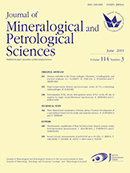
Journal of Mineralogical and Petrological Sciences
Pioneering Research in the Heart of GeosciencesThe Journal of Mineralogical and Petrological Sciences, published by the Japan Association of Mineralogical Sciences, serves as a vital platform for disseminating high-quality research in the fields of mineralogy and petrology. With a presence in both traditional and digital formats (ISSN: 1345-6296; E-ISSN: 1349-3825), this journal fosters scholarly engagement and innovation within these crucial branches of Earth Sciences. As evidenced by its Q3 ranking in both Geology and Geophysics categories for 2023, Journal of Mineralogical and Petrological Sciences maintains a significant standing within the academic community, contributing to the ongoing discourse and exploration of mineralogical phenomena and processes. Researchers, professionals, and students alike will find valuable insights and advancements represented within its pages, with a commitment to inclusivity in research output spanning two decades (2000-2024). Although not currently open access, the journal remains a key resource for understanding the complexities of our geological world.

Gondwana Research
Fostering Global Collaboration in Earth SciencesGondwana Research is a premier academic journal published by Elsevier, specializing in the field of geology, with a robust focus on the geological history and processes of the Gondwana supercontinent. With an impressive impact factor and ranking as Q1 in the 2023 Geology category, it stands as a leading platform for disseminating high-quality research. The journal features articles that advance the understanding of Earth and planetary sciences, making significant contributions to geological education and research. Researchers will find its curated content particularly valuable, as it encompasses a wide array of topics including stratigraphy, paleontology, and tectonics, all relevant to both contemporary and historical geological inquiries. Given its substantial reach and esteemed standing—ranked 5th out of 321 in its field—Gondwana Research plays a crucial role in fostering scientific exchange among global experts. Located in the United States with publication continuity from 1997 to 2024, this journal consistently attracts submissions from leading scientists, ensuring that its readership is kept at the forefront of geological discovery and innovation.
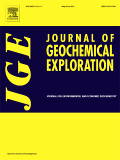
JOURNAL OF GEOCHEMICAL EXPLORATION
Advancing Insights in Geochemistry and Economic GeologyJOURNAL OF GEOCHEMICAL EXPLORATION, published by Elsevier, is a leading journal in the fields of Geochemistry and Economic Geology, with a notable Impact Factor and a commendable performance demonstrated by its Scopus ranking, where it holds the 22nd position out of 154 in Geochemistry and Petrology and 11th out of 43 in Economic Geology. Founded in 1972 and set to converged through 2024, the journal serves as a vital platform for disseminating high-quality research, providing insights into the complex relationships between geological processes and geochemical phenomena. Its articles contribute significantly to the understanding of natural resource exploration and environmental geochemistry, making it an essential resource for researchers, industry professionals, and students alike. Although not an open-access journal, it offers a wealth of knowledge aimed at advancing the field's boundaries and fostering innovative research initiatives. As an established outlet for the latest findings and methodologies, the journal's contributions ensure it remains at the forefront of geochemical exploration.
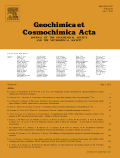
GEOCHIMICA ET COSMOCHIMICA ACTA
Fostering Knowledge in the Heart of Earth SciencesGEOCHIMICA ET COSMOCHIMICA ACTA is a premier journal dedicated to advancing the fields of geochemistry and petrology, published by Pergamon-Elsevier Science Ltd. With its ISSN 0016-7037 and E-ISSN 1872-9533, this esteemed journal has been at the forefront of scientific inquiry since its inception in 1950, with a strong commitment to disseminating high-quality research through 2024. Its reputation is underscored by an impressive impact factor and a ranking of #8 out of 154 in Earth and Planetary Sciences according to Scopus, placing it in the 95th percentile of its category. GEOCHIMICA ET COSMOCHIMICA ACTA serves as a critical resource for researchers, professionals, and students alike, offering insights into the complex interactions of geological and cosmological processes. While the journal is not open access, it remains a vital conduit for innovative research, fostering the scientific community’s understanding of earth materials and their significance.
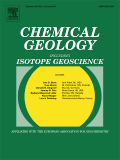
CHEMICAL GEOLOGY
Fostering Excellence in Geochemical Science and ScholarshipChemical Geology is an esteemed international journal published by Elsevier, dedicated to the rigorous exploration of geochemistry and petrology, with its foundational roots tracing back to 1966. As evidenced by its impressive Q1 ranking in both Geochemistry and Petrology as well as Geology in the 2023 category quartiles, this journal stands as a premier outlet for cutting-edge research and innovative methodologies within these vital fields. With a Scopus rank placing it in the top 10% of Earth and Planetary Sciences, Chemical Geology offers a platform for researchers, professionals, and students alike to disseminate findings that advance our understanding of geological processes and materials. Although it does not currently offer open-access options, the journal remains committed to high-quality publications that contribute significantly to the scholarly community. Located in the vibrant academic milieu of Amsterdam, Netherlands, Chemical Geology is an essential resource for those engaged in the earth sciences, aiming to bridge theoretical insights with practical applications.

MINERALIUM DEPOSITA
Unveiling the Secrets of Mineral DepositsMINERALIUM DEPOSITA is a premier journal in the fields of Economic Geology, Geochemistry, and Petrology, published by Springer. With an impressive 2023 impact factor and designated as Q1 in its category, this journal stands out in the academic landscape, showcasing the latest research and developments from 1966 to 2024. With a prominent rank in Scopus, holding the 3rd position in both Geophysics and Geochemistry and Petrology, it represents an invaluable resource for researchers and professionals alike. Although open access options may not be available, the journal's comprehensive coverage of mineral deposits promotes the global exchange of knowledge and advances in our understanding of the geological sciences. Positioned in Germany, MINERALIUM DEPOSITA serves as a crucial platform for innovative discussions, making it essential reading for students, professionals, and academics dedicated to exploring the complexities of earth sciences.
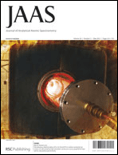
JOURNAL OF ANALYTICAL ATOMIC SPECTROMETRY
Shaping the Future of Quantitative and Qualitative Analysis.JOURNAL OF ANALYTICAL ATOMIC SPECTROMETRY, published by the esteemed Royal Society of Chemistry, stands as a vital resource in the fields of Analytical Chemistry and Spectroscopy. Since its inception in 1971, this journal has been committed to disseminating cutting-edge research, offering an invaluable platform for the presentation of quantitative and qualitative analytical methods. With an impressive impact factor and a current classification in the Q2 category of both Analytical Chemistry and Spectroscopy, it significantly contributes to the advancement of knowledge in these disciplines. Researchers, professionals, and students looking to deepen their understanding of atomic spectrometry will find a wealth of innovative studies, reviews, and methodological papers that consistently push the boundaries of traditional and emerging analytical techniques. Although not an open-access journal, it provides accessible options that facilitate the engagement of a broad academic audience, ensuring that vital research is not confined solely to institutional repositories. The journal's exceptional standing, demonstrated by its strong Scopus rankings, further underscores its critical role in the scholarly communication landscape.

Solid Earth Sciences
Illuminating the subsurface: where science meets discovery.Solid Earth Sciences is a dynamic open-access journal published by Elsevier, dedicated to advancing our understanding of the Earth's subsurface processes and materials. Since its inception in 2016, the journal has established itself as a vital resource for researchers and professionals in the fields of geochemistry, petrology, geology, geophysics, and geotechnical engineering, achieving a notable Q2 ranking in multiple categories as of 2023. With an ISSN of 2451-912X, the journal aims to disseminate high-quality research that enhances knowledge of earth surface processes and the intricate interactions within our planet's systems. The journal is indexed in Scopus, showcasing an impressive rank in various sub-disciplines, with a rank of #96 in Geology and a noteworthy percentile in Earth and Planetary Sciences. Solid Earth Sciences offers a platform for innovative studies, comprehensive methodologies, and cutting-edge technological advancements that cater to a global audience of scientists, academics, and students. With its commitment to open access, it fosters wider dissemination and impact of research outcomes, ensuring that pivotal discoveries reach stakeholders and contribute to real-world applications.
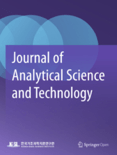
Journal of Analytical Science and Technology
Fostering Collaboration in the Heart of Analytical ScienceJournal of Analytical Science and Technology, published by SPRINGER INT PUBL AG, stands as a pioneering platform in the fields of Analytical Chemistry and Environmental Science. With an ISSN of 2093-3134 and E-ISSN 2093-3371, this Open Access journal, available since 2013, provides esteemed researchers with an opportunity to disseminate innovative research across a broad spectrum of applied science disciplines. The journal features a comprehensive range of studies addressing pivotal issues within Biochemistry, Genetics, Molecular Biology, Materials Science, and Physics, demonstrated by its impressive 2023 Scopus rankings in multiple categories, including Q2 in Chemistry and Environmental Science. Positioned within the UK and served from Switzerland, the journal actively encourages contributions that contribute to both practical applications and theoretical advancements, playing a vital role in fostering knowledge and collaboration among professionals, researchers, and students alike. Engage with the Journal of Analytical Science and Technology to contribute to and explore groundbreaking advancements within the analytical sciences.

Palaeoworld
Illuminating the Path of Evolution Through Rigorous ResearchPalaeoworld is a leading peer-reviewed journal published by ELSEVIER, focusing on the dynamic and interdisciplinary fields of paleontology, ecology, and stratigraphy. Established in 2006, the journal aims to facilitate the dissemination of innovative research and significant discoveries that enhance our understanding of past life on Earth. With an impressive impact factor and categorized in the second quartile (Q2) for Ecology, Evolution, Behavior and Systematics, Paleontology, and Stratigraphy in 2023, Palaeoworld stands out in its commitment to high-quality scholarship. The journal is indexed in Scopus, ranking #23 in Paleontology and #14 in Stratigraphy, placing it within the top 20% of publications in these categories. As a valuable resource for researchers, professionals, and students alike, it provides unrestricted access to cutting-edge findings, detailed methodologies, and critical assessments of paleo-environmental data. This journal is not only a repository of knowledge but also a platform for advancing discussions that bridge past ecological patterns with contemporary issues.